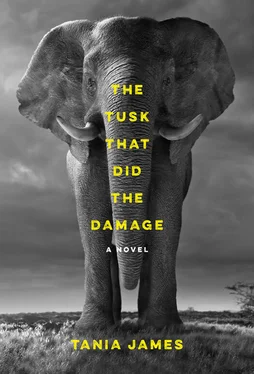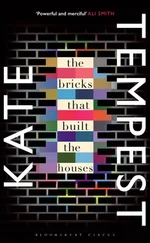Tania James
The Tusk That Did the Damage
FOR RACHEL KURIAN AND MARIAKUTTY LUKOSE,
THE MATRIARCHS
COLONEL HATHI: A Man-cub! [picking up Mowgli with trunk] Oh, this is treason! Sabotage! I’ll have no Man-cub in my jungle!
MOWGLI: It’s not your jungle!
— from the 1967 Disney film The Jungle Book
There is nothing left of my home
so I carry my home with me
— Lisa Ciccarello, “One Way of Doing Battle”
He would come to be called the Gravedigger. There would be other names: the Master Executioner, the Jackfruit Freak, the great Sooryamangalam Sreeganeshan. In his earliest days, his name was a sound only his kin could make in the hollows of their throats, and somewhere in his head, fathoms deep, he kept it close.
Other memories he kept: running through his mother’s legs, toddling in and out of her footprints. The bark of soft saplings, the salt licks, the duckweed, the tang of river water, opening and closing around his feet. He remembered his mother taking him onto her back before launching herself from the bank. In this way, their clan would cross, an isle of hills and lofted trunks.
Among them were two males, a broody old tusker and a twelve-year-old with ivory stubs he was always admiring with the tip of his trunk. As they roamed, the tusker brought up the back of the clan, but if a man were scented somewhere in the vicinity, the cows dropped their doings and circled the two tuskers. They knew what man was after. They offered their rumps instead.
They had walked the same routes for years, this clan, routes that the Forest Department would carve into foot trails of its own. They knew every bend and border, each rutted skull and bull they would meet along the way. But the Gravedigger hadn’t learned all there was to learn. His trunk, being stout and clumsy, couldn’t sense what his mother’s could sense — the sudden stillness in the rhythm of things, the peril in the air.
§
The Gravedigger was a few years old when it happened, still new to the world, but old enough that his mother had gone and calved another one. The newborn was a clumsy little cowpat. She toddled within the pillars of his mother’s legs precisely where he used to toddle. Whenever he tried to double back and regain her shade, his mother grumbled and nudged him onward with her trunk. If he fell behind, she flicked her tail until he grasped it, the two walking in tandem, ever in touch.
They emerged from the forest cover to the murky, algal smell of the lake. The water opened wide before them. The Gravedigger was first to splash into the lake, while the cowpat balked at the edge creeping darkly toward her feet. The old tusker slung his trunk into the air and dashed water over his spine.
Toward dusk, they roamed up the mountainside. Shola forest melted into grassland, staked here and there with shrub and tree built stout to withstand the cool. The wind had slackened by then and did not carry down to them, as it usually would, the smell of the man waiting among the branches of an evergreen.
A blast split the silence. The Gravedigger staggered, caught in a carousel of legs and screaming. The man in the tree was pointing a long-snouted gun. Another blast — the tusker bellowed deep and doomed. The Gravedigger whirled in search of his mother, and when at last he caught her scent, he found her roaring in the face of the gunman who aimed into her mouth and shot.
Her head snapped back. Her front feet lifted off the ground for one weightless moment, before lowering, folding beneath her. The whole of her sank with a thud that traveled the earth and ran like a current into the tender slabs of the Gravedigger’s soles.
He went to her. He touched her warm trunk, stretched straight but slack. He touched its ridges and folds, and the very tip, a single, empty finger with which she had pinched him a gooseberry not two hours before. A charred scent from her wound. No air from her nostril, no light in the eye.
All around: the stink of gunmetal and smoke.
He watched as two men climbed over the old tusker’s face. They pushed and pulled a saw across the bridge of the trunk. Blood spilled over their hands, over the air, as the trunk rolled limply to the ground. They chiseled at one side of a tusk, chipping at flesh, and knocked a hammer on the other side, some chipping, some knocking, until they gently tipped the tusk from the root, easy as a fruit.
They did this to the tusker and the almost-tusker, neatly and quietly opening each face. And then they noticed him.
One man strode toward the Gravedigger, his hair smelling of a sticky odor, some chemical scent mixed with pineapple rot. With the man’s every step, the world seemed to tighten. He was holding a knife.
The Gravedigger smelled urine streaming down his leg. He pressed himself against his mother’s still warm belly and waited to die.
The man walked past the Gravedigger, around his mother’s flank. The Gravedigger could not see what the man was doing. All he heard was the soft squeal of the knife. All he smelled was the pineapple rot.
At last the man rounded her body again and walked away, back to his people. A severed tail flicked from his fist, beckoning.
Everyone in Sitamala thinks they know my brother’s story. On the contrary. They may know the tune, but I would bet a half bag of pepper the words are all wrong. I blame his wife’s people for spreading slander, all those perfidious huge-hipped sisters, not a one half as lovely as Leela.
Our father was a rice farmer. He came from a time when to farm was a noble profession, when people sought our gandhakasala and our rosematta for their earthy fragrance superior to the stuff that now comes cheap from Vietnam. Who can remember those times with all these farms lying fallow and many a farmer’s son gone to roost in a soft office chair? And who am I to blame them, I who have seen the Gravedigger for myself and felt its breath like a steam on my face?
Some say my brother stepped into the very snare he laid for the elephant. I say opinions are cheap from far. I will take you to the Gravedigger myself and let you meet its honey-colored eye. I will show you the day it first laid its foot on our scrawny lives. Then you tell me who was hunter and who was hunted.
§
To know our troubles, you must know what happened to my cousin Raghu. When I think on poor Raghu, I see him stoking a small fire. I see him nudging a stick aside so as to let the flames breathe. I have called up this image many a time as if I were with him in the palli as I should have been that night.
The palli was a paddy-roofed matchbox on bamboo legs stranded in the midst of his father’s rice field, same as the ones in the neighboring fields. If a herd of elephants were to come glumping their way through the stalks, we were to wave the lantern and give the long caw that would set the others cawing. If this didn’t scare the herd away, we used crackers and rockets. But the herds became wise to our ways. They learned that our racket had no teeth to it, so they kept on eating their way through six months’ worth of our back-bent work. Sometimes we had to call the Forest Department; it would send three or four men to blind the beasts with headlights and fire ancient rifles. We called them greenbacks for their dingy green uniforms and their love of currency.
The herds were mostly cows, and they meant no personal harm unless you tampered with a calf. There is no one more fearsome than a mother enraged. In my youth I heard of a cow that cradled the carcass of her baby for days and would not be deprived of it.
Читать дальше












